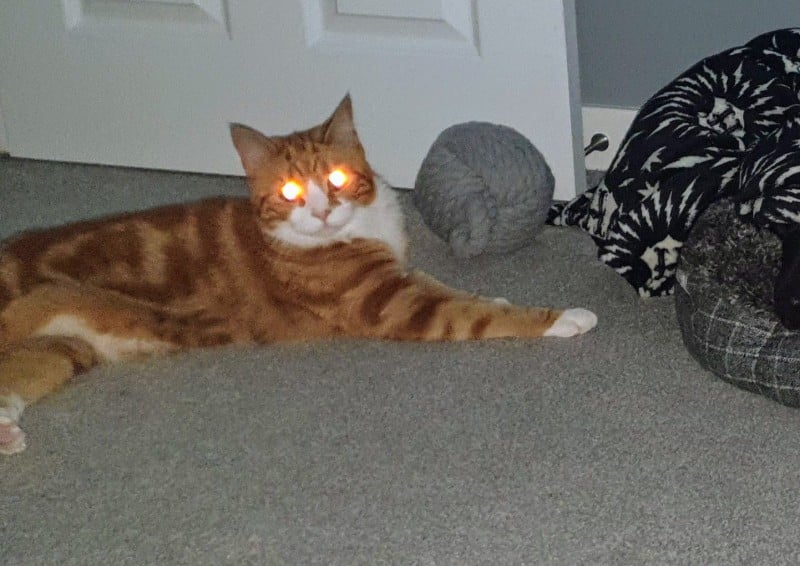The data is current and up-to-date in accordance with the newest veterinarian research.
Learn more »
Hi, I’m Dr. Karyn! Read my introduction to learn more about me and meet my five hilarious cats: Clutch, Cyril, Alex, Zelda, and Zazzles.
Considered one of the more difficult features of taking care of indoor cats is ensuring they get enough exercise, enrichment, and excitement of their lives. It’s easy enough to grab a lead and take the dogs out to the beach or the park, but not all cats are amenable to the harness lifestyle. One popular selection is the laser pointer, and it’s easy to understand why.
With very minimal effort on my part, I’ve got the cats running upstairs, downstairs, over the bed, and off the partitions. Even Cyril, who is known for his dedication to a life lived horizontally, cannot resist the flickering allure of that elusive red dot. But after reading about how lasers can negatively affect dogs, I began to develop into apprehensive about my ginger ninja, Alex.
Why Do Cats Love Laser Toys?
Although most of our domestic cats nowadays are less focused on hunting creatures and more excited by creature comforts, they aren’t that far faraway from their wild or free-roaming relatives. Buried deep inside that lazy exterior are the hunting instincts and prey drive of a lion, just waiting to be triggered by some fast-moving beastie. When our cats see the twitching movement of that laser, instincts take over, and so they soon find themselves unable to withstand the chase.
What’s strange about this particular game of cat and …dot, is that they never get to catch it, so you’ll think they might eventually grow bored. Nevertheless, as most cat parents (myself included) will let you know, every time the laser is retrieved from its draw, cats look like just as interested because the time before, and the handfuls of times before that. Zelda, particularly, sheds her regal and poised demeanor and turns right into a playful, energetic kitten if she a lot as hears the telltale sound of the laser being taken from its hiding place. Are they hoping that this time they may finally catch their prey? Or do they simply benefit from the chase?
Unfortunately, that is something only a cat can tell us, so for now, we must use what we all know to make a decision if laser toys are only a fascinating strategy to encourage our cats to play and burn calories, or in the event that they are a possible source of frustration, anxiety, and unhealthy obsession.
A Note on Laser Safety:
Never point a laser directly on the face or into the eyes. This is applicable to cats and all other animal species, including humans. For more information on laser pointer safety, click here.
Laser eyes Alex
When the Game Becomes Obsession
‘Laser Pointer Syndrome’ is an obsessive-compulsive disorder that has been recognized in our canine friends, with dogs becoming so fixated by the rapid movement of laser toys that they’re unable to loosen up. Their inability to finish the chase leaves them on edge, continually on alert for ‘the one which got away’. This has at all times been something that didn’t exactly worry me, however it did make me wonder, after I was twiddling with my cats. It wasn’t until Alex joined our fellowship of cats that I began to develop into concerned.
To start with, similar to all the opposite cats, Alex loved the fast-paced game of chasing the laser pointer, darting frantically across the house, following it up and down the steps, and over the cat tree. Then I began to notice him becoming fixated on anything with a reflective surface that sparkled on a wall or door – watches, cutlery, even the reflection from our metal door handle. Every night, Alex sits poised outside our bedroom, waiting for the moment that the sunshine from the lavatory hits our door handle good, sending a shimmer across the wall of the landing. This flash of sunshine lasts moments, one or two seconds at most, but he waits for it, every night. That’s after I began to get apprehensive.
How Do I Fix It?
The plain solution was to only throw the laser away, give it up cold turkey, which is precisely what I did. Nevertheless, this didn’t stop Alex’s light chasing behavior; he was just as obsessive about flickering lights and glossy surfaces as ever before. I had opened Pandora’s sparkling box and now I didn’t know how you can close it.
Don’t get me flawed, Alex was okay. He wasn’t stressed or permanently locked in a state of tense anticipation, however it did worry me that he was spending no less than an hour or two every night just waiting for a fleeting glimpse of a quarry he would never catch; a hunt that couldn’t ever end within the satisfaction of capture. Or could it?
A plan began to take shape in my mind, and I got here up with a possible strategy to bring closure to Alex’s unfinished business. I didn’t know if it might work, however it was price a try.
Step 1 – Buy a brand new laser toy
It may appear a bit like buying booze for an alcoholic, but seeing as cold turkey hadn’t worked, I desired to try weaning him off.
Step 2 – Introduce a brand new toy that he can actually play with
Interestingly enough, the laser toy I purchased got here with a bonus feathery mouse!
Step 3 – Start with the laser, end with the toy
My plan was to finish the sport with a physical reward, so that each one the hassle of chasing concluded with Alex capturing something he could actually grasp, kick, and chew.
I needed to get the timing right, ensuring that I switched off the laser in the intervening time he grabs the toy, but I felt as much as the challenge! But wouldn’t it work?
The Re-education of Master Alex
Sometimes it’s about trial and error, and it turned out that Alex wasn’t as excited concerning the latest toy as I’d hoped! His best buddy Cyril, however, was very interested. It turned out that Alex was more food-motivated, so as a substitute of a toy, I directed the laser towards a small pile of his favorite treats, and voila! His attention immediately zeroed in on the food, and the laser was quickly forgotten.
I used to be quite pleased to see that in each instances, Alex and Cyril, once they were focussed on the treat at the tip of the laser game, didn’t start looking around for the elusive little dot, whereas normally, they might remain on high alert, waiting for it to maneuver again. I don’t expect that this may completely eradicate Alex’s fascination with all things shiny, but the primary attempt went higher than I believed, so I’m optimistic that we are going to give you the chance to alter how he views the laser.
Alex doesn’t have to hunt for his food…
Are Laser Toys a Bad Idea?
Not necessarily, and in lots of cases, they will actually be probably the greatest ways to show a sedentary cat right into a fast & furious feline by providing an outlet for his or her seldom-used hunting instincts. But I feel that, in the identical way some humans can’t drink, gamble, or shop without becoming addicted, certain cats are predisposed to laser pointer syndrome, something that researchers have began to explore. In a suggestion just like my method, others have suggested combining laser play with clicker training, giving cats a tangible reward at the tip of the sport.
Early surveys suggest that laser toy obsession is more more likely to occur in cats under two years old, which inserts with Alex’s situation. Obviously, I wish I had known about this potential hazard after I first introduced him to the laser 4 years ago, but whilst a vet, I’m continually learning.
And hopefully, my experience with Alex might help a few of you avoid the identical issue. In case you’re going to introduce your cat to the fun of chasing a laser, be certain you can give that chase a satisfying conclusion.




